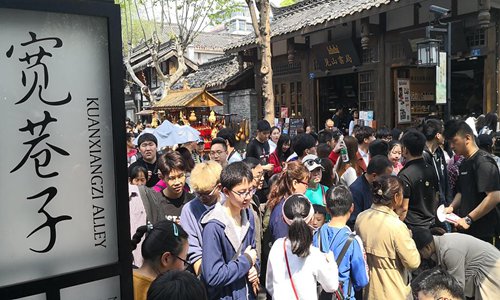Tourism revenues over the May Day holidays in 15 provinces exceeded 10 billion yuan ($1.48 billion), with Southwest China's Sichuan Province ranking first out of the 23 provinces that published data in China, China News Service reported Wednesday.

Photo: VCG
During the holidays, there were 195 million domestic tourists in China, an increase of 13.7 percent from the previous year.
Tourism revenues reached 117.67 billion yuan, marking an increase of 16.1 percent, according to data of the Ministry of Culture and Tourism (MCT).
Of the provinces that have published tourism data, the revenues of 15 provinces each reached 10 billion yuan.
Southwest China's Sichuan Province ranked first, which was the only province with tourism revenues of over 30 billion yuan.
The total tourism revenue of East China's Jiangxi Province, Central China's Henan Province and Southwest China's Chongqing Municipality exceeded 20 billion yuan, while that of South China's Guangdong Province exceeded 10 billion yuan for the first time, reaching 18.65 billion yuan, according to China News Service.
Chengdu, capital of Sichuan Province, has become popular with tourists eager to take pictures of its famous urban landmarks and enjoy hot pot.
High expenditure from consumers is closely tied to Chengdu's ability to attract overnight tourists.
Revenues from overnight tourists in Chengdu reached 12.55 billion yuan, increasing 81.7 percent from last year.
Staying overnight means that tourists spend more time traveling and have a more in-depth travel experience, resulting in an increase in consumption on catering, entertainment and shopping, China News Service reported.
The cultural and tourism market has boomed beyond expectation and various measures have been taken to improve the tourist experience locally.
Packages catering to families and postgraduate students have become a hot topic, driving consumption on culture, leisure, catering and rural areas according to MCT.


